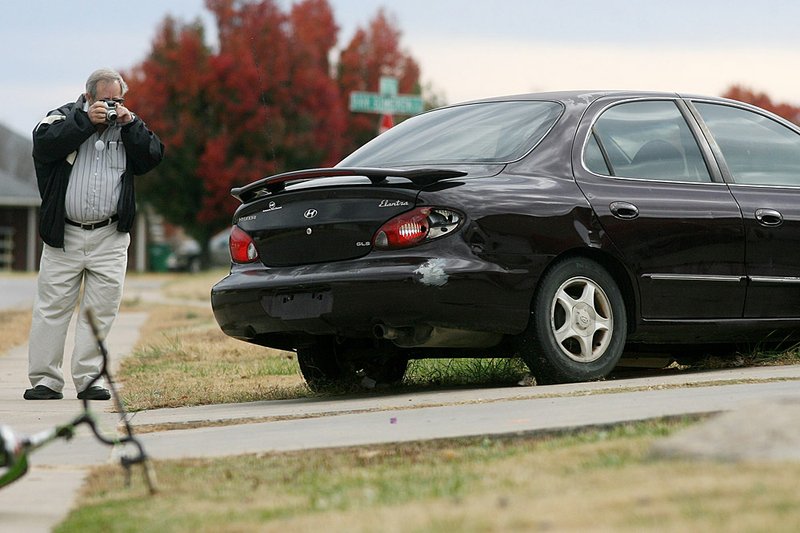SPRINGDALE — Code enforcement officers know where to go if they want to find violations of a Springdale law forbidding parking on grass.
Officers Bobby Nivens and Mike Sidney one day last week took only a few minutes to find three violations in the Oaks Addition, a subdivision in an eastern area of the city that’s dominated by long rows of duplexes.
“This one has been here a while,” said Sidney, pointing to a Hyundai Elantra that’s been sitting on a lawn in front of a Braxton Avenue duplex long enough for Bermuda grass to snake up through the car’s back wheel. “The ordinance says you can park parallel to the driveway, but it has to be away from the front door.”
And, even cars correctly parked parallel to driveways are being monitored. If a car’s tires put ruts in the lawn, it’ll be out of compliance, too.
Several Arkansas cities have laws meant to keep people from parking in yards as a way to protect aesthetics, and warnings rather than citations dominate the work of the code enforcers.
The Springdale City Council approved its law in 2007, and its enforcement officers cited 29 car owners for illegally parking on grass that first year. Another 1,024 people received warnings, Assistant City Attorney Ernest Cate said.
After writing 138 citations in 2008, enforcement officers’ tickets have dwindled the past two years. There were 20 citations last year and 11 so far this year.
“I think the city looks better, but I don’t know how much of that we can attribute to the parking-in-yard ordinance,” said Springdale Mayor Doug Sprouse.
Other Northwest Arkansas cities concentrate on warning people rather than writing citations.
“In the grand scheme of things, that’s pretty low on the priority pole,” said Rogers City Attorney Ben Lipscomb, explaining why Rogers hasn’t cited a single person in district court since its law took effect in 2007. “There are alot bigger problems and our resources can be spent more prudently on other issues than cars in the grass.”
James Willett, the city’s code enforcement director, said the warning system has improved the city’s appearance. The possibility of getting a ticket causes people to move their cars off lawns.
“We’re like teachers,” Willett said. “We don’t write the textbook. We just use it to educate.”
Rogers code enforcement officers issue a warning and then return within a day or two to ensure that the car isn’t back on the grass. Compliance has gotten better over time.
“Usually, if it’s a repeat offender, we give them a little speech,” said Rogers code enforcement officer Alfredo Franco.
The Fayetteville City Council put its parking on grass ordinance into effect in 2007. Most of the 321 violations of parking-related ordinances since its inception were for parking on grass, and those people all received warning letters. If that didn’t fix the problem, second warning letters followed.
Five residents were reported to the city prosecutor’s office, but none of those cases ever went to court, said Jesse Fulcher, the city’s current planner.
There are exemptions in Fayetteville, including days when the University of Arkansas plays home football and basketball games. An unlimited number of vehicles can fill up yards on game days so long as they don’t arrive more than 12 hours before the game starts and are gone 12 hours after it’s over.
Fayetteville retiree Harriet Jansma contacted the city on Sept. 8 after seeing cars in yards on Clinton Drive as she drove to the University of Arkansas campus.
“I began to see great stacks of cars in front of those houses,” Jansma said. “That drive is pretty tree-covered. When people drive and park on the roots, the trees die.
“There used to be eight or 10 or 12 cars out there in the yards on those roots.”
Now, there aren’t as many cars. Jansma is happy.
“I didn’t want to take anybody to court, but I didn’t want anyone to kill those trees, either,” she said.
In North Little Rock, the City Council decided in 2008 to let neighborhoods decide whether to create special parking districts banning yard parkers. Four neighborhoods - Argenta, Lakewood, Overbrook and Park Hill - have gained the City Council’s approval to ban it, said Tom Wadley, the city’s code enforcement director.Signs identify which neighborhoods are parking districts, Wadley said.
“We’ve decided to let the neighborhoods decide,” Wadley said. “You’ve still got older homes in areas where they have a single driveway, and the people in those areas don’t want anything to do with a parking district.”
Wadley said code enforcement officers have written 31 citations this year to people who parked in yards in those areas. The fine is usually $35, Wadley said.
Little Rock earlier this year passed a parking-on-grass law, discouraging residents from parking cars, boats or other vehicles in front and side yards. The city received 1,059 complaints between June 1 and Oct. 31 and determined 536 people did have vehicles parked in violation of the law, said Tracy Roark, the city’s code enforcement manager.
Four people were written citations when the vehicles were still on grass seven days after the initial warning, Roark said.
Just 10 of the 306 complaints in Fort Smith about vehicles parked on grass have led to people paying fines since its law took effect in July 2008, said Rick Ruth, property maintenance supervisor of the city’s neighborhood services division.
The maximum fine for a city ordinance violation is $1,000 in any Arkansas city, but few cities charge so much to yard parkers. In Springdale, people are most often fined $25, $50 or $100 and must pay $25 in court costs.
“It’s certainly a good tool to have,” said Cate, Springdale’s assistant city attorney. “People used to complain about neighbors with cars in their yard, and we didn’t have the tool to enforce it. It was a common complaint of people and now we can address it.”
Arkansas, Pages 7 on 11/22/2010
